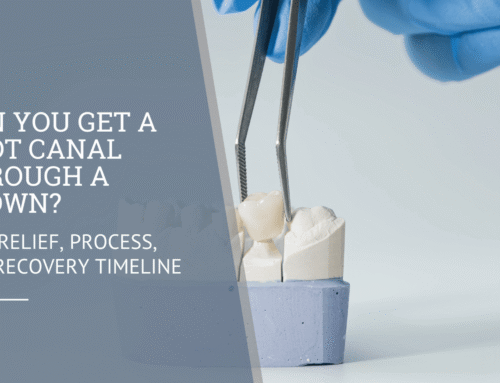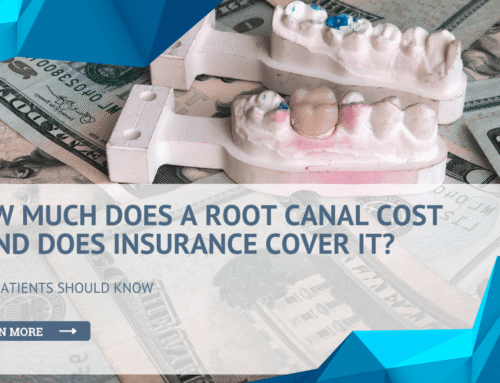It’s totally normal to feel a little nervous after getting a root canal—especially if something doesn’t feel quite right afterward.
One of the most common things patients ask us is:
“Is it normal to have swelling after a root canal?”
Let’s walk through what’s normal, what’s not, and when it might be time to give us a call. (Spoiler alert: most swelling goes away on its own, but we’re always here if you need us.)
First Things First: A Little Swelling Is Totally Normal
Yes—mild swelling after a root canal is common, especially within the first 24–72 hours.
Here’s why:
During the procedure, your dentist or endodontist cleans out infection from inside the tooth. This can sometimes irritate surrounding tissue, especially if the infection was already advanced. Your body’s natural healing response may include:
-
Minor swelling around the gum or jaw
-
Tenderness when chewing
-
A general feeling of soreness near the treated tooth
This usually fades within a few days and can be managed with over-the-counter pain relievers and rest.
What Causes Swelling After a Root Canal?
Swelling is your body’s way of responding to irritation or infection. After a root canal, it can be caused by:
1. Inflammation from the Procedure
Even though the infection has been removed, your body might still be responding to trauma or pressure from the treatment. This is especially common if the tooth was very inflamed beforehand.
2. Residual Infection
In some cases, swelling could mean there’s still a bit of infection lingering in or around the tooth. That’s why root canal retreatments exist—we want to make sure everything is fully healed.
3. An Abscess That Needs Time to Drain
If there was an abscess before your root canal, it might take a few days for the swelling to go down as the area clears out and your body heals.
4. Allergic Reaction or Irritation
This is rare, but possible—especially if there’s sensitivity to materials used during the procedure.
When Should You Be Concerned?
Swelling that sticks around isn’t always a red flag, but there are times when it’s best to contact your endodontist.
Call us if you notice:
-
Swelling that increases instead of decreases after 2–3 days
-
Swelling that’s accompanied by fever or chills
-
Throbbing pain that doesn’t improve with medication
-
Swelling that spreads to your face or neck
-
Difficulty swallowing or breathing
These symptoms may indicate a more serious infection or complication, and we’ll want to see you right away to take care of it.
How to Reduce Swelling at Home
If your swelling is minor, here are a few easy ways to manage it while you heal:
- Cold Compress: Apply to the outside of your cheek for 10–15 minutes at a time. This helps reduce swelling and numbs the area.
- Pain Relievers: Over-the-counter meds like ibuprofen or acetaminophen can help with both pain and inflammation.
- Rest & Hydrate: Give your body time to heal. Skip hard or crunchy foods, and drink plenty of water.
- Follow Aftercare Instructions: Rinse with warm salt water (if recommended), avoid chewing on the treated side, and keep up with gentle brushing and flossing.
Is Swelling Always a Sign of Infection?
Not necessarily. A little puffiness is often just part of the healing process. But if you’re unsure, trust your gut—and reach out.
We always say: If something feels off, let us know.
We’d much rather have you check in early than wait too long.
Preventing Post-Procedure Swelling in the Future
While some swelling is unavoidable, here’s what helps keep it to a minimum:
-
Getting treatment as soon as symptoms show up
-
Following your aftercare instructions closely
-
Staying in touch with your dental team if anything changes
Early treatment usually leads to faster healing and fewer side effects.
Swelling Happens—But It Shouldn’t Last
It’s completely normal to experience mild swelling for a couple of days after your root canal. But anything more severe or persistent might be your body’s way of saying it needs a little extra help.
At Eastern Idaho Endodontics, we’re here to make sure you heal comfortably—and confidently. If you’re ever unsure whether what you’re feeling is normal, don’t hesitate to reach out. That’s what we’re here for!
FAQs: Swelling After a Root Canal
1. How long should swelling last after a root canal?
Usually 1–3 days. If it lasts longer or gets worse, contact your endodontist.
2. Is swelling always a sign of infection?
Nope—some swelling is just part of the healing process. But persistent or severe swelling could be a sign of residual infection.
3. What helps reduce swelling?
Cold compresses, anti-inflammatory medication (like ibuprofen), and rest are your best tools.
4. Should I be worried if my face swells?
Facial swelling should be taken seriously, especially if it’s rapid or painful. Call your provider right away.
5. Can I still go to work or school with mild swelling?
Absolutely—as long as you’re comfortable and not showing signs of infection, you can go about your day (with a little extra TLC!).




